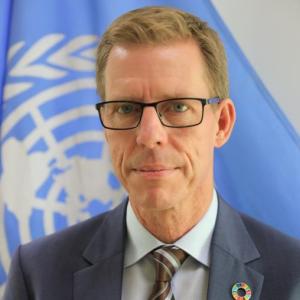It is my pleasure to join you today to launch the national campaign in commemoration of the 16 Days of Activism Against Gender-Based Violence. I thank the Government of Jordan under the leadership of the Inter-Ministerial Committee for Women’s Empowerment, the Jordanian National Commission for Women, the National Team for Family Protection Against Violence, the Family Protection Department, as well as all civil society and media partners for this tremendous joint effort and leadership.
As you know, traditionally we convene at this time of the year to amplify the voices of survivors of violence who are claiming their rights and fighting for justice. Yet, this year is like no other.
As we heard, since the outbreak of COVID-19, emerging data and reports from those on the front lines, have shown that all types of violence against women and girls, particularly domestic violence, has intensified. A ‘shadow pandemic’ as the UN Secretary General described it.
We also know that different groups of women and girls have been impacted differently by the pandemic. Socio-economic pressures have exacerbated the situation of the most vulnerable women in Jordan, including refugees, migrant workers, and those living with disabilities. As the world relied more on virtual means of communication, we also witnessed new threats posed by online harassment and cyberbullying, especially among the youth.
The risk of reversing decades of progress in the fight against gender-based violence and inequalities is high.
The Government of Jordan already adopted significant measures to strengthen services for survivors of violence during the global crisis, and to integrate prevention and response to violence against women and girls into national plans, including the recent addendum to its National Strategy for Women.
National ownership is critical to ensure that commitments translate into action. The UN family in Jordan commends such efforts and remains fully committed to support Jordan, at all levels, in achieving our shared goal to prevent and end violence against women and girls.
We are also deeply inspired by all those serving in governmental and non-governmental organizations, working tirelessly and with unwavering commitment to provide life-saving assistance to survivors of violence during such challenging circumstances. We are also proud that we were able to sustain some of these initiatives with the support of the wider international community.
Ladies and gentlemen,
If we aim to be successful in building back better, stronger, resilient and equal societies, it is a time for bold prioritization and accelerate joint efforts in response to gender-based violence in the context of COVID-19.
Based on the UN Secretary-General’s call for action for this 16 Days campaign, and by leveraging the UN Socio-Economic Impact Framework, as UN system we are working with national partners across four, inter-linked priorities areas of advocacy:
- FUND: prioritize funding for GBV prevention and response in COVID-19 fiscal stimulus packages, making flexible funding available for civil society organizations working at the nexus of COVID-19 and GBV, especially at the grass-root level.
- PREVENT: the essence of this social mobilization and joint awareness raising effort, paired with concreate action and attention to system and social norm shifts, engage men and boys, provide timely assistance to women and girls facing intersecting inequalities.
- RESPOND: ensure that minimum essential services for survivors of violence are maintained during the pandemic, including legal aid, especially for the most underserved and disadvantaged groups of women and girls – our ‘Leave no one behind’ imperative.
- COLLECT: data for improvement of GBV services and to inform national plans and programmes.
As part of this comprehensive approach, there are several initiatives that the UN system is implementing in support of national priorities to end gender-based violence. We developed an essential services package for women and girls subject to violence to ensure the provision and coordination of quality services. We also conducted a gender in humanitarian action review to assess the accessibility of such services among refugee populations and host communities. Building on global standards, we are looking at the estimated cost of domestic violence to inform policy reform.
Allow me to conclude by highlighting the key role played by journalists and media professionals in Jordan, in both raising awareness on COVID-19 as well as in narrating our ‘new normal’, creating a sense of unity and solidarity in times of confinement. We continue to count on your support to raising awareness on domestic violence during this critical time.
Ending gender-based violence is our shared responsibility, and we all have a role to play.
I look forward to joining this year campaign, renewing efforts and partnerships to stop the escalating violence, recover and rebuild from COVID-19.
Thank you.



